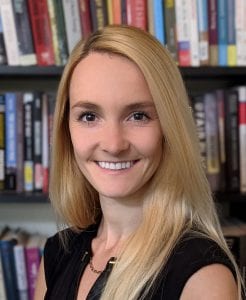Prestigious Fellowship Opens Fresh Opportunities For Nuclear Studies Ph.D. Student

Doreen Horschig, a doctoral candidate in the Security Studies program, has been awarded the Roger L. Hale Fellowship. This highly competitive one-year fellowship provides an exemplary individual with an outstanding opportunity to develop professional skills by working at a leading peace and security institution. She was also recently accepted into the Nuclear Scholars Initiative by the Center for Strategic and International Studies’ Project on Nuclear Issues.
Horschig is currently completing her dissertation titled “An Illusional Nuclear Taboo: Mechanisms of Domestic Attitudinal Patterns for Extreme Methods of War.”
College of Sciences: What attracted you to your area of study?
Horschig: I was always interested in the field of international relations – probably because my dad discussed world news with me at an early age. But it wasn’t until two classes during my Master’s studies at New York University that I really got into nuclear policy. My professor and mentor, (Dr) Joseph Helman supported me in writing my thesis on the conditions of nuclear deterrence. That’s when I realized that the nuclear status quo of modernization and proliferation is not sustainable, and the consequences of inaction are unacceptable. That was my motivation to pursue a Ph.D.; to develop the necessary research skills to make significant contributions to the field of nuclear nonproliferation efforts. Even if it’s just a small contribution, I hope to use my Ph.D. to support policy development that advances nuclear arms control.
College of Sciences: What is the idea behind your dissertation?
Horschig: My dissertation studies public attitudes towards nuclear weapons use. The idea is it to find out why some people are supportive of nuclear weapons despite their gross destructive outcomes. A camp of the nuclear use literature found that public opinion is not as aversive to these weapons as public polls show and non-governmental organizations and activist groups often assume. I build on this to explain why that might be. I find that when individuals are prompted to think of their own death (by building on terror management theory from psychology), they become less risk aversive and increase their support for the usage of extreme weapons. The nuclear norm against these weapons becomes fragile. Broadly speaking, people who are more routinely facing an existential threat that reminds them of their death will support greater use of nuclear weapons. In an age of populism characterized by the rise of nationalist leaders with authoritarian tendencies, this finding is a source of significant concern. Accordingly, my research advances a current understanding of why nuclear weapons disarmament, elimination and non-proliferation is deeply challenging. When we cannot rely on public opinion to avoid a nuclear war, the role of responsible leaders and institutions becomes crucial.
College of Sciences: What does the fellowship represent to you?
Horschig: The Roger Hale fellowship presents me with outstanding opportunity to develop my professional skills by working at a leading nuclear security institution. Getting the fellowship is not just a validation for me and my research work, but also for the doctoral Security Studies program and my dissertation advisor Dr. Güneş Murat Tezcür. I’ll be able to work at the forefront of nuclear nonproliferation policy, gain practical experience grappling with a wide variety of nuclear weapons policy issues and improve my writing skills. While I’ll be able to build on my dissertation research, I can also gain more in-depth knowledge on nuclear weapons.
A dissertation focuses very much on one niche topic. So, working with and for the Ploughshares Fund will give me the opportunity to work on a much broader range of nuclear policy topics and not one isolated one. 2021 is a an exciting time to be working with a Washington D.C. think tank because we see renewed progress on nuclear arms control. We have the major arms control treaty with Russia (New START) that was just extended for five years and see renewed discussion of restoring the Iranian nuclear deal. On top of that, the Biden administration is assembling a national security team with an ambitious agenda to negotiate new arms control treaties. Overall, there needs and can be much more done in the realm of nuclear arms control. I hope to be able to contribute to this effort while working with the incredible team at Ploughshares.
